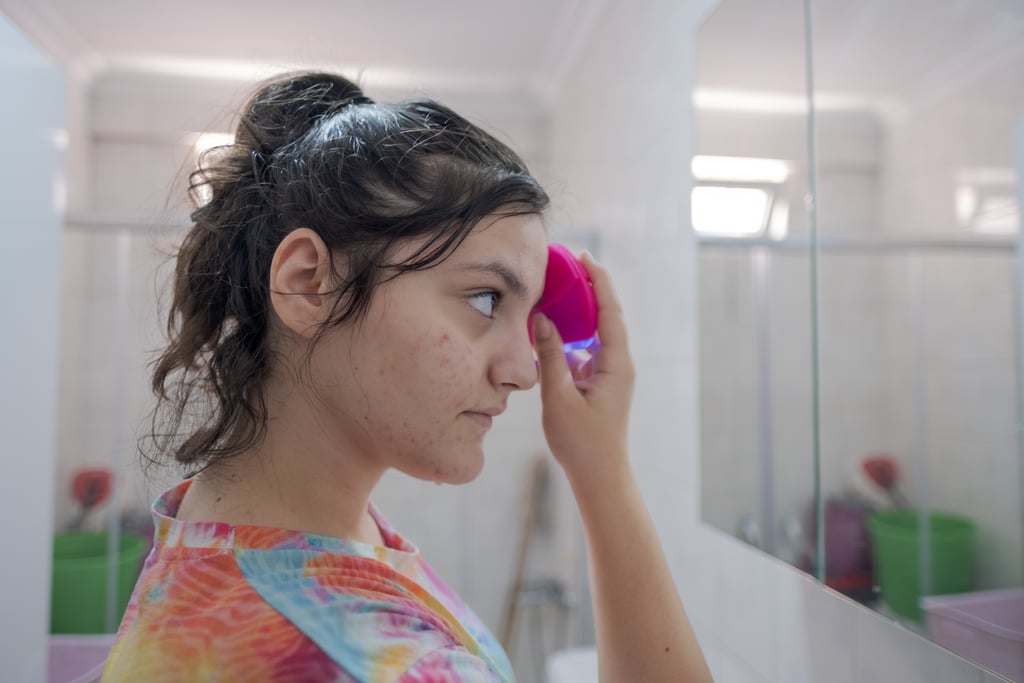Mid-september means many things; pumpkin spice lattes [1] on repeat, panic coat shopping for the sudden drop in temperature, and a return of great autumn TV shows. But for thousands of school leavers, it also marks the move to university [2] and the beginning of the initiation that is Freshers Week. The start of the autumn term is synonymous with hedonism, booze, takeaways, and nights out, and many Brits look back on the wild week as the best of their lives. Yet with such a hefty legacy comes a lot of pressure on young students to "make the most of it". So how do you know you're doing it "right"?
The truth is, not everybody loves Freshers Week. While some find the concept of drinking jägerbombs, staying up all night, and stealing traffic cones thrilling, others find the idea overwhelming. Also, you can't guarantee that your week will go to plan. Mishaps will probably happen and you might feel homesick, experience housemate clashes, have some awkward sexual experiences [3] or find yourself wishing for the week to be over. Even still, it's an experience that you'll remember forever, so you might as well try your best to lean into the madness.
It's likely you'll have received advice from teachers, friends, and older family members in the lead-up, but what are the real pieces of wisdom that will get you through? I was one of those very students six years ago and arrived at uni wide-eyed and ready to start my new adult life. So what do I wish I'd known? From choosing housemates too early to getting serious FOMO, read ahead for 21 tips that will get you through Freshers Week.
Freshers Flu Will Get You

Freshers Flu is not a myth. According to Student Beans [4], 22 percent of university students said they think they've had Freshers Flu in the past. Nearly half of these people said illness held them back from fully enjoying the week. I can tell you that Freshers Flu is definitely real, because my body succumbed to it within days.
So what actually is Freshers Flu? According to Dr Hana Patel, a GP and Mental Health Coach, it is "the result of lots of different people mixing and being exposed to different bacteria and viruses that they may not have before, causing a flu like illness." The illness is very common at the start of every academic year and normally impacts first year students at university the most thanks to the sudden change in lifestyle. It manifests differently from person to person, but the symptoms are generally similar to that of a flu or a cold: tiredness, temperature, muscle aches and pains, sore throat, cough, reduced appetite, and a headache. The good news is, it should only last up to two weeks. And if you're lucky, your body will fight off the infection within three to four days.
Sadly, you can't really avoid catching Freshers Flu. Dr Patel said, "As with any cold or flu, you can be unlucky and pick Freshers Flu up from anywhere. Other than avoiding Freshers week and socialising with lots of new people, general advice such as mask wearing, washing hands, and sanitising hands after touching surfaces could help." If you've already caught Freshers flu by the time you're reading this, Dr Patel recommends taking medicines for your specific symptoms, and speaking to a pharmacist or GP to get some help managing more persistent symptoms. You'll get through it!
You Can't Survive on Junk Food Alone

A treat is absolutely fine every now and then, but sadly you can't live on beans on toast and custard creams all year. It's best to come to university armed with a few simple recipes that you can make quickly, cheaply, and that will fuel your body with some nutrients and healthy calories. Dr Patel advises all students to eat five fruits and vegetables a day, and to cut back on alcohol and quit smoking altogether. She said, "Healthy eating helps our immune system and reduces our risk of being unwell."
You Don't Have to Drink

Drinking culture is normalised at UK universities, but that doesn't mean it is healthy. One survey by Northumbria and Durham Universities [5] found that undergraduates at seven different universities in England found very high rates of dangerous drinking, with over 40 percent identified as "hazardous drinkers", 10 percent as "harmful drinkers" and another 10 percent as "probably alcohol dependent". Pub crawls and boozy night outs might be the done thing, but there are other ways of socialising.
Don't let people peer pressure you into drinking if you don't want to. Just be honest and tell people that you don't want to drink. If people give you grief about wanting to stay sober, ignore them. You need to surround yourself with people who respect your decisions.
Arguments Over Chores Will Happen

Not everybody has the same standards of cleanliness, and you're going to have to learn that the hard way. If you're used to being a little messy at home, you're in for a rude awakening in your university halls. Dishes won't wash themselves, and people will get annoyed at you for leaving dirty plates and cutlery in the sink. They'll be vocal about this, too. For those of you who are proud neat freaks, you're going to have to accept that you can't turn everybody into Monica Geller from "Friends" overnight. Everyone has different standards, but there needs to be mutual respect in shared living areas.
Lynsey Crombie [6], ITV's "This Morning" Homecare Expert recommends calling a meeting with all housemates to make a plan as soon as you feel it is appropriate to. It's worth being honest and setting the standard before passive-aggressively pinning a chores schedule to the kitchen noticeboard a month down the line. Being reasonable and trying to come to an agreement that works for everyone right at the beginning could save you the awkward accusations and the blame game in months to come. Lynsey adds, "Set some house rules and try to either set a rota where specific tasks are done on rotation or tasks are delegated to specific people. Include things like emptying the bins, cooking, washing up, lounge tidy and refresh, cleaning the shared bathroom, and so on."
Another tip is to leave one cupboard in the kitchen empty. That way, you can put other people's mess in that cupboard to be claimed later rather than being left on the kitchen table all day. Or, Lynsey recommends having an "odd box", so if things are left laying around they can be placed in here. She said, "People will soon get bored or having to look through the odd box and start to put things away."
To see more cleaning tips from Lynsey, check her student cleaning checklist here [7].
Always Use Protection

University is renowned for sexual experimentation, so whether you're planning on having sex or not, it's vital to be prepared. The average age women lose their virginity in the UK is 18.3, according to a study by Durex's Face of Global Sex report [8]. This means that, as you'd expect, a lot of people are arriving at university with no experience dealing with contraception.
You don't want to be forced to pay a trip to the medical centre to get an STD test or even emergency contraception in the first week of university. For that reason, Dr Patel advises everyone to use a barrier method of contraception. This includes condoms, diaphragms, and caps. "These will help you to avoid sexually transmitted infections, but some infections such as chlamydia can be silent and you may not know that your partner has them," she says. The GP also recommends thinking about long term contraception, and registering with a local GP at your university in case you need to get tested for STIs or need advice. She adds, "It's a good idea to get a full STI check between partners, to ensure your sexual health safety but that of your partner, especially if you are having casual sex."
Don't Decide on Second Year Living Arrangements Too Soon

The bond you have with your first year housemates can be intense, but try not to get carried away with the excitement of moving to university and meeting new people. No decisions made at 3 a.m. on the walk back from the student union are wise decisions. Resisting the urge of sorting your second year accommodation and tying yourself to one group of people too early on might feel irresponsible or mean, but it's really not.
You're going to meet plenty of new people throughout the year, and you may end up not enjoying the experience of living with this group of friends. Take it easy, and don't panic about sorting accommodation until after Christmas. I fell out with my housemates in the final term of first year and was left scrambling to find new accommodation in the weeks before the summer break began. I managed, but it would've been easier if I hadn't made the second year pact so early on.
Leaving Assignments Until The Last Minute Is Not Fun

It can be really hard to manage your time at university. Making sure you're attending everything, doing the reading, keeping up with extra curricular activities, and experiencing the wilder side of university can be a lot to deal with. It's inevitable that you will end up leaving assignments or revision until the last minute on the odd occasion.
While chugging energy over a 3,000 word essay might be part of the university experience, I promise you it is not fun. You'll get better grades if you're more prepared, and you can hand your essay in early and spend the night celebrating. It's a good idea to work on your assignment for at least 10 minutes a day every day until the last couple of weeks before it's due. This might not sound like much, but the minutes add up. By the week before your essay is due, you will have spent so much time mulling over your approach and playing around with ideas that you'll have a more convincing and thought-through final piece. The same advice is true for lab reports, exams, and other forms of test.
Joining Societies Will Open Up Your Social Calendar

Joining clubs might not have been the cool thing to do at school, but it's commonplace at university. On Freshers Week, attend the Freshers Fair and figure out what interests you outside of your course. You might have been rubbish at netball or hockey at school, but there are a whole range of sports that you've probably never tried waiting to be explored over the next three years. From cheerleading to rowing, you might find something you have a natural talent for.
If you're not interested in sports, universities normally have a wide selection of non-sporty societies. For example, my university, had a Harry Potter [9] society, a wine tasting society, and an animé society. Joining one is just as much about making friends and feeling part of a community as it is actually gaining experience in this particular field. It doesn't matter if you're not great at what you choose, there's always time to improve and you'll build a lot of relationships along the way.
Look After Your Skin

You might have coasted through your teenage years with baby smooth skin without even trying, but acne and other problems are likely yo hit you soon after Freshers Week. An increase in greasy, sugary, and fatty foods, a newly lax laundry routine, sleep deprivation, more makeup, and lots of dehydrating alcohol will wreak havoc on your skin.
Make sure you always take your makeup off before a night out and keep up a regular skincare routine to try and combat this change of lifestyle. It doesn't have to be pricey, but it does have to be thorough. Face wipes and micellar water are okay for the first step of removing your party glam, but you should follow up by cleansing your skin with an effective cleanser and a flannel. Then, make sure you're applying moisturiser before bed and upon waking up. Clean your pillowcases once or twice a week, and if you're using flannels or muslin cloths, never reuse them without washing them first.
Don't Succumb To FOMO

Freshers Week is the best time to party because you don't have to worry about studying or classes, but it's not your only chance to go out. You have three years of fun ahead of you. That foam party you're worrying about missing but feel too tired to attend? Don't panic, there will be another one next month. If an early night in bed with Netflix is calling you, then that's what you should do.
First Year Does Matter

You'll hear the same phrase repeated over and over again by fellow students: "first year doesn't count anyway". While this isn't necessarily wrong, don't let that fool you. First year knowledge acts as a foundation for the rest of your degree. Translation: You can't learn the hard stuff without a basic understanding of the easy stuff first. Unless you want to spend your second year slaving away in the library and trying to catch up, make sure you're working hard as well as playing hard.
I only just passed my first year, and while that didn't impact my final grade, it meant I wasn't allowed to spend a year studying abroad in New York. Learn from my mistakes and check if the year in industry or study abroad programmes require a specific first year grade before you decide to spend every waking moment at the student union club.
Wise Up with Money

While studying at school, you might have had a summer job or weekend job that gave you a little bit of pocket money. When you join university, you might be taken back by the amount of money you receive if you get a student maintenance loan. It can be difficult to spend wisely when you've got such a large sum in your account. However, you need to avoid splashing it all at once.
"When you first receive your student loans, it can be difficult, especially at a younger age where you're not used to having so much in the bank account, for it to feel like an endless amount, until it starts dropping rapidly," Jeremy Helm, financial analyst for MWB Solutions [10], says. "It's why most studies show the rate of expenditure from the start of the loan until the next loan coming in involves 65 percent of spend occurring in the first month."
Instead, Helm recommends setting out the number of months you have until your next loan or bursary, work out your basic costs, for example rent and bills, and then breaking up the disposable income into set months or weeks. "That way you won't go over this amount and find yourself struggling near the end. You can open a separate bank account to put these savings in, so it's out of sight and out of mind until absolutely necessary," he says.
9 a.m. Is Not That Early

You're probably used to getting up at 7 or 8am for sixth form or college, but getting up for the dreaded 9am lecture feels impossible at university (especially after a night out). We hate to break it to you, but 9am isn't an unreasonable time to get up and out of your flat. You're probably going to have to wake up much earlier when you enter the working world, so it's a good idea to get used to early starts.
Take it from someone who attended about 10 percent of her lectures in the first year (no, I'm not joking). You will fall behind if you don't go to lectures. Even if your lectures are recorded, be honest with yourself, you're probably not going to make the effort to catch up. Make it a priority to be physically present at your lectures and seminars. They're the reason why you went to university, and you only have to push yourself through a few hours a day. If you don't, you'll only feel guilty and struggle to complete assignments.
When staff and peers start to notice your poor attendance, it's your reputation on the line. Other students won't want to partner up with someone who doesn't come to lectures and hasn't done the reading, and your teachers won't make an effort to give you extra help outside of class if you haven't put the effort in to begin with.
Find Out Which Discount Cards You’re Entitled To

Make the student life work for you! There are so many different discount cards and coupon codes available that you might not be aware of. For example, you can get a 16-25 travel card to lower your regular cost of travel. Your university student card alone should entitle you to discounts at most venues, attractions, and exhibitions. You should also check if you can change your regular subscriptions (e.g. newspapers, streaming platforms, and so on) to a student rate.
There's a Big Difference Between School and University Grading

Leaving a school where you excelled in the subject you've chosen to take at degree level is really bewildering. Suddenly, you're a small fish in a big pond, and everyone around you is equally as good at this subject. You may find yourself dealing with imposter syndrome or not feeling good enough to be enrolled on your course. You'll feel this the most when you get your first assignment back. It can be scary to be greeted with a 65. Weirdly, at university scoring 65 percent on an essay is actually really good. That's 2:1 standard! You'll soon learn that getting over 80 percent is almost unheard of, so take the small wins and try to remember that things are graded a little differently at this academic level.
Set a Laundry Day

It's easy to let your dirty washing build up, as there's far more exciting things to be doing at university, but try not to! You know your university schedule, so try to stick to a regular laundry day every week to ensure you've always got fresh clothes to wear. You never know what plans you'll be invited to, so it's always best to be prepared. Spontaneous nights can be the best nights out.
You might even need to venture to a laundrette to get you batch of washing done. Even though today's world is digital and mostly cashless, you'll likely need coins to pay for your laundry. Keep a stash of coins in your room to ensure you're never stuck with a pile of dirty clothes and no way to wash them.
Get To Know Your Tutors

University staff can feel much less approachable than your teachers at school, purely because they teach so many students and you don't get to know them as well. However, you should try your best to chat to staff and go to their office hours. They may be able to help with an assignment, give you revision tips, or answer your questions about a specific topic you're struggling with.
I'm not ashamed to admit that I genuinely cried in the offices of my favourite seminar leader in my first year. I felt swamped and overwhelmed, and a casual meeting turned into somewhat of a therapy session. Being open and honest about my concerns helped him to know how to help me, and I was allowed a deadline extension on the essay I was panicking about. That simple conversation marked a turning point for me and I felt much more supported in my studies throughout my degree. Also, this seminar leader wrote a job reference for me after I had graduated.
Buy Second Hand Books

Money is tight during your time at university, even if you've got family and a loan to support you. Every penny counts, so don't waste hundreds on brand new books from the university bookshop. Lecturers will tell you that you all need the same edition of the book to be able to find the right page, but you can find a second hand version.
Check to see if there are any used versions for sale on Amazon as these are normally much cheaper. Look on eBay, Depop, Vinted, Shpock, Facebook Marketplace, World of Books, and other online marketplaces, too. Or there might be a group on Facebook dedicated to your university or your degree. Here, you can find out if anyone from the year above is selling their old books. Alternatively, see if you can borrow your books from your university's library. The only downside to this is that you can't write notes in the margins, and you might have to take these books out again when exam period comes.
Avoid Being Too Generous

You might think you're being polite by offering to buy other people drinks, but you probably can't afford to be so generous! "It can be tempting when at university to buy your friends a drink, but you're at a stage where finances are tight and you'll regret it when you look at your bank balance in the morning," he says. "It can be awkward if someone offers to buy you a drink and you can't return the favour, so politely say you're ok when they offer so you don't feel required to buy others drinks. Focus on your own budget, not everyone will be thinking wisely about their finances, but that shouldn't affect your expenditure." The same goes for picking up things for people at the supermarket, paying for other peoples' club entries, and covering the cost of a taxi.
That Referencing Lecture? Listen To It

You probably didn't learn about referencing at school, but it's about to become the bane of your life. Every time you use a statistic, quote, or use some kind of information or idea that isn't your own in an essay, you have to write down its source. Your seminar leaders or lecturers will talk you through the ins and outs of referencing at the start of the year, and it's probably one of the most important things you'll learn in your first year. It's definitely boring and sounds simple enough, but pay attention and write notes. Being proficient in referencing will save you hours and hours of time throughout your degree. Thank me later.
Be Yourself

You might be rolling your eyes, but honestly the best thing you can do on Freshers Week — and throughout university — is be yourself. If you struggled to make friends at school, you might put pressure on yourself to make everyone like you in Freshers Week. It's important to remember that not everyone is going to "get" you, and that's okay. Being authentic with your likes and dislikes, and your hobbies and interests, is a shortcut to building meaningful relationships. The sooner you start being yourself, the sooner you'll find your tribe.